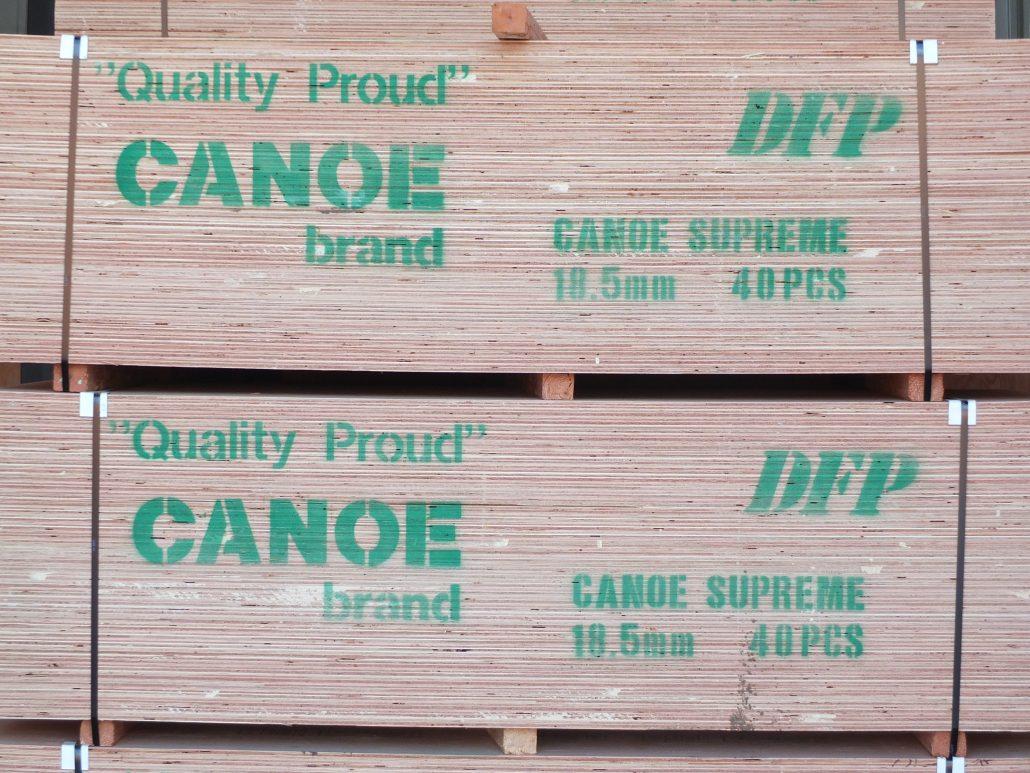At CANOE We Make Only One Brand….
CANOE brand®….Quality Proud!
- Annual Capacity: 145 Million SF
- Species: 80% Douglas Fir, 20% SPF
- Certification: CanPly: CSA 0121, CSA 0151, PS 1-09, JAS, CE
- Products:
- Good One Side
- Precision Sand
- Selects, Oil and Edge Sealed
- CC-PTS, Sheathings
- Easy Floor T & G, Easy Roof T & G
- Truckload, Vanload and Carload Shipments
Forest Products – Plywood
The plywood plant employs approximately 175 people on a 7 day per week, 4 shift basis. Annual capacity is 145 million sq.ft.. This is enough plywood to construct 22,000 homes. Panels range in thickness from 7.5 mm (5/16″) up to 28.5 mm (1-1/8″).
Our Plywood Production Process
- Logs from the forests are delivered into Shuswap Lake then brought out of the water by a jack ladder to a conveyor, forcing the logs through a debarker.
- The debarker removes the bark from the logs and cuts them to a specific length as ‘peelers’.
- Once the bark is removed and the logs cut to length, they are placed in a heated conditioning vat where the water is heated to 60°C for a period of 12 to 14 hours.
- From the conditioning vats, the logs proceed to the lathe where they are peeled into ribbons of 1/8” thick veneer.
- The veneer is then fed through a natural gas dryer at 177°C. Drying time ranges from 3 to 12 minutes, depending on the thickness and moisture content of the veneer.
- Dry veneer is then taken to an automated lay-up line where each sheet of veneer passes through a glue curtain and laid up into various panel thicknesses.
- The panels are now placed in a press at a temperature between 140°C to 149°C and a pressure of 175-200 pounds per square inch therefore creating a permanent bond between plies with a waterproof glue. Depending on thickness, pressing time ranges from 3.75 minutes to 8 minutes.
- From the press, the plywood panels move to the sizing saw, trimmed to 1220mm x 2440 mm (4’x8’) sheets; and, graded as Good One Side, Select, Sheathing or a custom specialty panel.
- Further upgrading can occur by tongue and grooving, sanding, or oil and edge sealing the plywood for construction or industrial applications. Finished plywood production is 100% Douglas Fir.
The plant produces an average of 18,000 panels 4’x8’ or approximately 7 truckloads per day.
If these panels were laid end to end they would measure almost 44 kilometres per day or almost 11,000 kilometres per year.
The by-products from the plywood manufacturing process are wood chips, peeler cores, and hog fuel, therefore everything is used, nothing is wasted.
The Canoe plywood plant was the first plywood mill in Canada to receive certification to grade plywood for Japan under the stringent Japanese Agricultural Standards (JAS).


